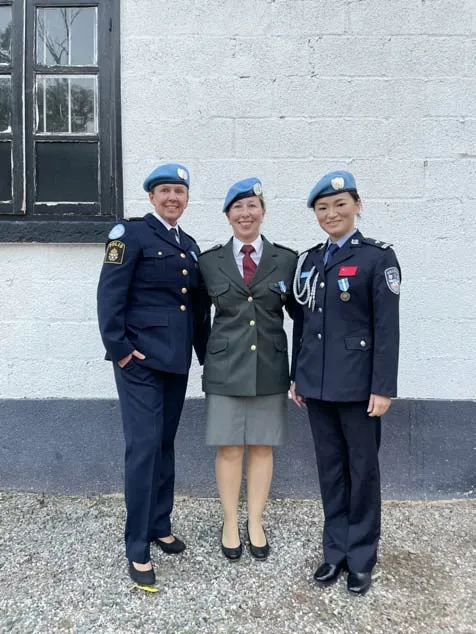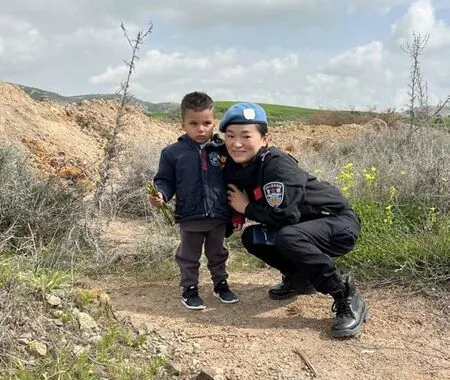我在塞浦路斯做群众工作
2022-03-29赵韵子
文/赵韵子
任务区概况
塞浦路斯位于欧、亚、非三大洲的交叉路口,地处重要文明的交汇处,具有显著的战略地位,在不同时期先后被统治东地中海的各个大国所征服。这里是爱与美之神——阿佛洛狄忒的诞生之地,这里有着世界一流的海滩,满地种植着象征和平的橄榄树,曾经的海上明珠却无法为自己争取到长久的和平统一。
塞浦路斯的居民主要由希腊族和土耳其族人组成,其中希族占人口的80%以上。由于文化传统、宗教信仰和风俗习惯的不同,希土两族在历史上积怨甚深。1974年塞浦路斯的希土两族联合政府解体,北方希族人南迁,南部土族人北移。双方在岛屿中部由东向西划出一条狭窄的无人地带,被称为“绿线”,由希土两族和联合国维持和平部队分段设卡,塞岛从此南北分裂。联合国1964年3月派出驻塞浦路斯维和部队,负责确保180公里缓冲区内的稳定和现状。维和警察在这里的主要工作是在缓冲区内巡逻,调解希土两族间的民事纠纷,维持当地社会的治安与稳定,监控南北过境点,预防、调查和报告缓冲区内的所有非法活动,包括倾倒废物和非法移民等。
自2015年中国第一次向塞浦路斯派驻维和警察,至今已经有37名中国警察在这里执行过或正在执行维和任务。
开启维和之路
我是一名土生土长的重庆妹子,大学毕业于重庆警察学院,之后成为一名普通的治安女警。2019年3月15日,是我结婚十周年纪念日,当天我抱着试一试的心态向所在分局提交了维和警察报名表,并将这个决定当作一个小惊喜告诉了爱人。虽然有些担心和不舍,但对于这个百里挑一的机会,他给予了我极大的鼓励和支持。有了家人的支持我决定放手一搏,接下来我积极准备复习外语知识,练习驾驶技术,最终从几百名报名者中脱颖而出,代表重庆警察幸运地同30位战友一起去往中国人民警察大学接受封闭维和培训。两个月之后,我们接受了严苛的联合国甄选考试(SAAT),并获得了来之不易的派遣资格。然而,突然暴发的新冠肺炎疫情打乱了原有的计划安排,经历了漫长的等待和一轮又一轮的筛选面试后,我最终如愿以偿,获得了派出机会。2021年5月27日我带着家人的牵挂和不舍,和同是重庆的两位战友一起踏上了飞往塞浦路斯的飞机。
初到塞浦路斯,我和同事临时租住在联合国总部营地附近,在这里接受为期十天的上岗培训并通过考试后正式上岗工作。联合国总部营地设在首都尼科西亚,这里是世界上唯一被分裂的首都,城市就像一个被时间打碎的拼图,现代和老旧、光鲜和残破的建筑与街道被随意地拼接在一起。与国内截然相反的驾驶方向和习惯,让这里的一切看起来既熟悉又陌生。行走在总部营区里,与身着各式各样制服、行色匆匆的人擦肩而过,不由从心底燃起一股重庆女孩的倔劲,我在这里代表的是中国女警,一定展现出我的专业。

与外国女警一起参加授勋仪式

与缓冲区里摘芦笋的儿童合影
经过一系列的考核面试,我最终被分配到四战区的皮拉警局。这里可谓是全任务区警情最复杂也最忙碌的警局,全岛在缓冲区里的村庄现存一共四个,大部分警局缓冲区几乎无人居住,而皮拉警局所管辖的缓冲区内就有两个村庄,其中一个便是目前全岛唯一一个两族混居的皮拉村(Pyla)。在这里,任何民事案事件都需要在联合国安理会决议的框架下,谨慎按照尊重双方的处理模式进行以示公正。而作为联合国警察我们也必须在联合国授权范围内,在尊重各方执法背景和环境下找到最好的解决之道,否则很容易触碰到敏感的民族情绪,而演变成无法预料的政治事件。加之所辖缓冲区一部分与英军主权基地交界,当一个事件涉及三方权益的时候,情况将变得更加复杂多变。所以,在这里的工作不仅要能熟练地运用语言,还要有极高的政治敏锐性和工作技巧。
面对诸多挑战,我没有退缩和胆怯。为了尽快熟悉情况,我跟着同事开车巡逻,一开就一整天,缓冲区的每条大路小路,每一个观察点,都让同事带着我一遍一遍地走,一天下来开100多公里是常事。
靠着国内群众工作的经验,我知道要想更快掌握情况,必须实地走访,与人打交道,跟村民聊家常,跟商店老板聊生意,跟农民聊收成……利用女性在沟通方面有着耐心细致的优势,我逐渐与当地社区建立起信任,给社区警务工作打下坚实的基础。作为警局中唯一一位单独执行巡逻任务而没有配备搭档的女警,我已经处理报告包括从非法侵入到酒驾、盗窃等超过80起各类案事件。虽然我在警局中已经算经验丰富的“前辈”,但我依然在每一次处警的过程中不断学习和积累,同时也收获了更多感悟。
辖区内有一位叫尼克拉斯的农场主,我在巡逻中多次走访了他的农场。他会热情地接待我,送我自产的牛奶,我也送给他从中国带去的小礼物。慢慢地,他对我讲起了他的故事。他的父亲在战争中与他们失散,年幼的他与母亲逃难来到这里,多年艰难的打拼让他拥有了现在美满的家庭和事业。一位当初目睹他父亲遇害而没有伸出援手的人从“北塞”来到他家,登门致歉,尼克拉斯告诉他从此不用背负歉意,因为他早就选择了原谅。伤害可以被原谅,但伤痛却无法被忘记。战争的苦难反而造就了他如今乐观豁达、慷慨感恩的个性,让他更加珍惜如今幸福的生活。他说只有选择放下才有力量继续前行,否则将永远生活在痛苦中。作为出生在红旗下,成长在改革开放后的“80后”,如果不是来到这里,我没有机会如此近距离接触到战争的伤痛。他的话让我感触良多,我不仅庆幸自己生活在和平安定的国家,也深深感受到作为维和人员的责任与使命。
“我们的武器只有腿和嘴”
很多朋友听到我在国外维和,都会好奇地问我:这么危险,你一个女性,去了能干什么啊?你们有枪吧?每当听到这样的疑问,我都会半开玩笑地回答:我们的武器只有腿和嘴。
在塞浦路斯任务区,作为民事维和警察,我们所有的权力只有监督、调解、观察和报告,并没有实际执法权,要想在有限的空间取得更好的工作效果,那就只能靠沟通技巧和警务技能。这里不同的语言不同的文化背景虽然会带来一些困难,但作为治安警做群众工作化解纠纷就是我在国内的日常工作,所以这里的工作环境反而让女警的善于沟通、富有亲和力、柔韧坚毅的优势得到了更好的体现。
记得有一次深夜,我独自驾车巡逻,被路边一个少年拦下求助。少年自称,由于他女友的父母不同意他们的恋情而与他在街边起了争执。女孩情绪激动地坐在地上一边抽泣一边扬言要自杀,她的父亲则在一旁威胁男孩。见此情景,我按程序通知了当地警方,然后劝开男孩让他通知自己家人到场,又以一位母亲的身份对女孩父母进行劝解,随后安抚女孩直到警方和救护车到来,最终事态得到了控制,化解了一场家庭纠纷。

在中塞建交50周年图片展上,向时任塞浦路斯外交部长介绍中国维和警队
数十年来,联合国大力推进女性参与维和事业,而女性维和警察在保护弱势群体、促进妇女参与、加强社区沟通等方面具有显著的优势。不管从外部环境还是自身能力来讲,这都是中国女警参与维和行动的良好机遇。我有幸在此时加入维和警察队伍,并在疫情肆虐的特殊时期获得派遣资格,还在这样的形势下得到各级组织的信任,被委任为驻塞浦路斯维和警队第一位女警队长。这不仅是对我的一个鞭策,更是中国公安部对女警参与维和的有力支持,让各国维和警察有机会看到中国女警的实力。
作为历史上存续时间最长的维和任务区,欧洲国家一直拥有其话语权。在语言、文化、制度等方面欧洲国家都比亚洲国家更具有优势。在工作中,我不时感受到来自各个国家同事对中国的误解。所以,在完成好自己工作的同时,我还加强了对西方文化制度的学习,努力了解并懂得如何运用规则制度,用西方的底层逻辑讲好中国故事,从而提高中国维和警队的软实力。
在过去一年中,新冠肺炎病毒一波又一波冲击着全球,塞浦路斯全岛累计确诊病例数已经超过全国总人口的30%。我身边的同事朋友们接连确诊,作为警队队长的我也感到巨大的压力。我及时给警队添置防护用品,在任务区疫情防控规定基础之上制定了中国警队的防疫规定。全体队员按照任务区安排坚持巡逻,恪尽职守,在出色完成工作的同时依然保持了零感染。
当我敲下这句话时,还在塞浦路斯继续执行着维和任务。维和之路必定是充满艰辛和挑战的,但这一路风雨后的收获和成长将成为我人生中最宝贵的财富。最后希望我的故事能够抛砖引玉,让更多更优秀的战友们大胆走出国门,展示中国女警的专业和风采。■
Serving Locals in Cyprus
By Zhao Yunzi
At the intersection of Europe, Asia and Africa, great civilizations converge. It is such a strategic position that Cyprus fell prey to succeeding military powers in the eastern Mediterranean. It is home to Aphrodite, the ancient Greek goddess of love and beauty, as well as superb beaches and olive trees, a symbol of peace. However, the “pearl on the sea" has failed to secure peace and unification.
Its population mainly consists of Greek Cypriots and Turkish Cypriots, with the former accounting for over 80% of the population. Running long between the two sides is a feud due to difference in culture and religion. Following the collapse of the coalition government in 1974, the Greek Cypriots moved south while the Turkish Cypriots moved north. There emerged an unpopulated strip across the island from east to west, known as “the Green Line,” where the Greek Cypriots, Turkish Cypriots, and the United Nations Peacekeeping Force set up checkpoints, thus dividing the island into two regions.
The United Nations Peacekeeping Force in Cyprus (UNFICYP) was deployed in March 1964 to ensure the stability of the 180-kilometer buffer zone. The peacekeeping police are responsible for patrolling, handling civil disputes between the two groups, maintaining social security and stability, manning the checkpoints to the southern and northern regions, as well as preventing, reporting and investigating illegalities within the zone, including dumping and illegal immigration.
A total of 37 Chinese police officers have served or are serving in this area since the Chinese government dispatched the first group of police to Cyprus in 2015.
Born and bred in Chongqing, I became a public security policewoman after graduating from the Chongqing Police College. It was on March 15, 2019, the 10th anniversary of my marriage, that I submitted the application to join the mission. I told my husband about my decision as a surprise. Despite his deep concerns, he encouraged me to take the hard-won opportunity.
With my family’s support, I decided to go. In the following days, I practiced my foreign language and driving skills very hard. Luckily, I was chosen on behalf of Chongqing with another 30 police officers from hundreds of applicants to take training courses in China People’s Police University. Two months later, we took the assessment conducted by the United Nations Selection Assistance and Assessment Team (SAAT) and were granted qualifications. However, the unexpected outbreak of COVID-19 disrupted the original plan, so I had to wait for a long time and took round after round of interviews before I finally got the chance to embark on my mission. On May 27, 2021, with the love of my family, I boarded the plane for Cyprus with two other colleagues from Chongqing.
Upon arrival, my colleagues and I were temporarily accommodated around the headquarters. Here we underwent a 10-day orientation training and passed tests before we took our posts. The UNFICYP headquarters is stationed in Nicosia, the only divided capital in the world, much like a jigsaw puzzle with a patchwork of modern and dilapidated buildings and streets. The people here drive on the left side of the road, which makes it familiar but also strange to us. Among the police officers in various uniforms at the headquarters, I, as a typical Chongqing girl, cannot help acting unyielding. A Chinese policewoman is to be professional in all aspects.
After successive tests and interviews, I was assigned to the Pyla Police Station in Sector Four, one of the busiest units with the most complicated situation. Mostly unpopulated, the buffer zone has four villages. Two of them are located within our jurisdiction, including Pyla village, the only one where the Greek Cypriots and the Turkish Cypriots coexist.
For the sake of justice, any civil cases or incidents should be resolved in accordance with UN resolutions and with full respect to both sides. As the UN’s police force, we must act under the authorization of the UN, and find the best solution satisfactory to all parties concerned. Otherwise, we may provoke national sentiments that could evolve into unexpected political issues. As the buffer zone borders a British Sovereign Base Area, any case concerning the interests of the three parties could complicate the situation. So working here involves linguistic proficiency, political awareness and professional excellence.
I didn’t flinch at these challenges. To familiarize myself with the situation as quickly as possible, I asked other colleagues to take me on patrol, sometimes for the whole day. We would drive some 100 kilometers a day to check each road, trail and observation post over and again.
From my previous experience working with people, I know that to learn more about the situation here, I should visit and get close to the locals: to chat with villagers, talk about business with shopowners and crops with farmers. Thanks to women’s innate advantages in communication and carefulness, I have gradually built trust with the local community, which paved the way for further services. As the only policewoman to patrol alone, I have handled and reported over 80 cases of different kinds, such as illegal trespassing, drunk driving and thefts. Though a veteran, I am keen on learning every case.
I often visit Nicholas, a farmer in our jurisdiction. He is hospitable and gives me some home-produced milk for free and in return I leave him with small gifts from China. One day he told me his stories. When he was young, his father got separated from the family due to the war. He and his mother fled and settled down here. After years of hard work, he has a happy family and his good business. A man from the northern region who witnessed Nicholas’ father being killed but did not help came to the farm to apologize. But Nicholas told that man not to feel guilty because he had already chosen forgiveness.
Harm is forgivable, but agony is unforgettable. The scourge of war made Nicholas an optimistic, generous and grateful man who cherishes his present life. He said that only by letting go of the past can we move on. Otherwise, we will indulge ourselves in sufferings. As a girl born in the 1980s and brought up in peace under the leadership of the Communist Party of China, I would never taste the pain of war if I hadn’t joined the mission. I thought a lot about his words. I count myself lucky to live in a peaceful country and I feel obliged to keep peace in a war-ravaged country.
Curious about my peacekeeping job in a foreign country, many friends said, “It must be dangerous. What can you do there as a girl? Do you have a gun?” Hearing such questions, I always answer them jokingly: We have no weapons but legs and mouths.
As civil police officers in the mission zone, we are not entitled to enforce law but only exercise oversight, meditation, observation and reporting instead. To work effectively in such a context, , we must improve our communication abilities and professionalism. It may pose a challenge to work with the local people across different languages and cultural backgrounds, but solving public disputes is what I do at home. I believe that this environment can bring into full play the advantages of female police officers: communicative, amicable, and resilient.
I remember that once a teenaged boy stopped my car when I was patrolling by myself late at night. He claimed that his girlfriend’s parents disagreed with their relationship so they squabbled by the road. The girl sat on the ground, threatening to commit suicide, her father coercing the boy. I dutifully reported it to the local police, asked the boy to bring his parents to the scene, and talked to the girl’s parents as a mother. I kept soothing the young lady until the local police and an ambulance arrived. Finally, the dispute dissolved.
The UN has been promoting women’s engagement in peacekeeping campaigns for decades because they show prominence in protecting vulnerable groups, contribute to women’s participation in society and improve communication at the local level. Personally and professionally, this is a good opportunity for Chinese policewomen to get involved in peacekeeping missions. With the trust from my office and higher-ups, I am honored to join the force at the height of COVID-19 and be appointed the first female Chinese police chief. It gives me increased impetus, shows the firm support of the Ministry of Public Security of China to women’s participation in UN peacekeeping operations, and demonstrates Chinese women’s capability to other peacekeeping countries.
This mission area is most longstanding peacekeeping mission in history. As Cyprus has long been subjected to the influence of European countries, it is easier for peacekeepers from these countries to perform duties due to their strengths in language, cultural backgrounds and social systems. I encountered misunderstandings with colleagues from other countries from time to time. To ameliorate this, I began to study western cultures and systems after work, and to understand their rules and regulations, so that I can tell Chinese stories in a way that fits the logic of the western public and improve the soft power of the Chinese peacekeeping police forces.
Over the past year, the COVID-19 pandemic has continued to rage with frequent flare-ups across the globe. The number of confirmed cases in Cyprus has exceeded 30 percent of the total population. My colleagues and friends got infected one after another. As the team leader of the Chinese forces, I am under heavy stress. I applied for more personal protective equipment and set up health and safety protocols for my team on the basis of the local directives, so that all my team members can continue taking patrols as scheduled to honor our commitment with zero infection.
As I write down these words, I’m still performing duty in Cyprus. Of course it is a painful and challenging journey. But I believe that what I gain from this experience will be treasured for a lifetime. I also hope that my stories can inspire many others so that more excellent police officers will take missions abroad and present to the world the professionalism and excellence of the Chinese policewomen. ■
